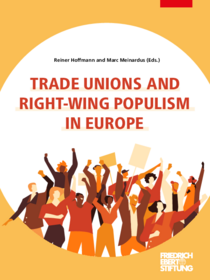Trade unions and right-wing populism in Europe

Hoffmann, Reiner ; Meinardus, Marc
Friedrich-Ebert-Stiftung - Bonn
2023
299 p.
extremism ; population ; trade union attitude
Politics
http://library.fes.de/pdf-files/international/20316.pdf
English
04.04-68639
"Foreword:
The rise of right-wing populist movements and parties is an almost universal phenomenon in Europe. Right-wing populist tendencies are not without consequences for trade unions. On the contrary, the patterns of social interpretation propagated by right-wing populism are highly problematic for trade unions: There is a danger that the solidarity of workers will erode and fragmentation will be amplified, which, in turn, will negatively impact the solidarity-based policy of interests in companies and beyond. It is to be feared that right-wing populist threats will ul-timately lead to the reduction of universalist-oriented workers' rights and social welfare bene-fits based on collective agreements. The economic, labour, and social policy discourses and practices of many right-wing populist parties in Europe have similar overall objectives and methods, with individual party peculiari-ties making each group unique. A key commonality can be found in the identification of the “social question” as an essential reference point in the struggle for political interpretative power and political majorities. The trade unions perceive right-wing populism, albeit to different degrees, as a force that endangers and calls into question the solidarity-based representation of interests through, on the one hand, the strategic weakening of trade union solidarity relations and, on the other, a frontal attack on the trade unions themselves. This is directed, above all, against trade unions' institutional power. Against this background, the Friedrich-Ebert-Stiftung (FES), in accordance with the German Trade Union Confederation (DGB), initiated a Europe-wide study at the beginning of 2022 to examine trade union options for dealing with right-wing populist forces. This investigation in-cluded the commissioning of a sequence of 12 country studies and a comprehensive com-parative analysis of the political processes and trade union experiences in the participating countries. Despite the often similar, or at least comparable, situations in which the European trade un-ions find themselves when dealing with right-wing populist forces, the process of inter-union learning has been rather underdeveloped to date. This study is intended as a contribution to the promotion and reflection of the cross-border exchange of information and experience. The aim is to explore whether and how trade unions can learn from each other in the face of similar challenges and sometimes quite different operating contexts. It is aimed at trade union activ-ists and members, decision-makers in the political partner spectrum of the FES, and an inter-ested public."
Digital;Paper
The ETUI is co-funded by the European Union. Views and opinions expressed are however those of the author(s) only and do not necessarily reflect those of the European Union or the ETUI.